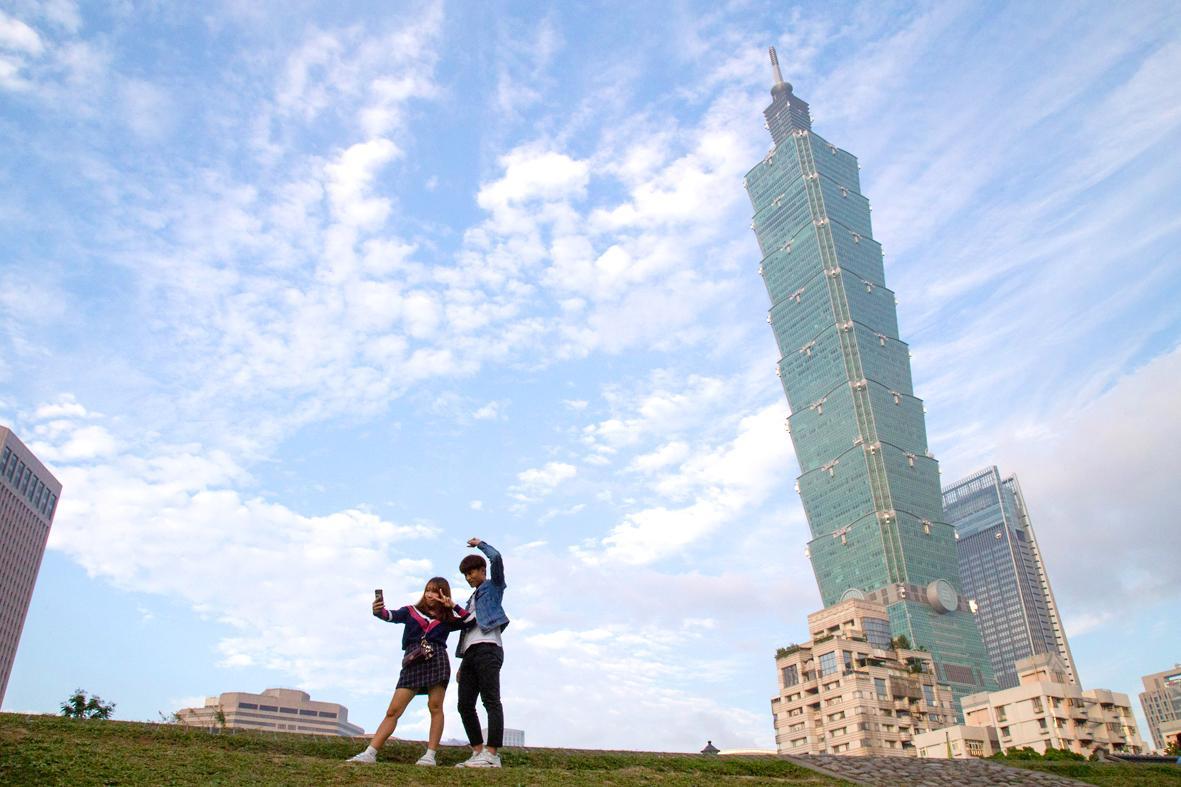Taipei has once again made it onto the top 100 list in the annual global cities index compiled by Oxford Economics, moving up five places from last year to be ranked the 60th best city in the world this year.
The annual index was published last month following an evaluation of the 1,000 most populated metropolises, based on five indices: economics, human capital, quality of life, environment and governance.

Photo: Bloomberg
In the overall rankings by Oxford Economics, New York maintained the top spot this year, ranking first in the economics index on the strength of its vibrant financial industry and economic stability.
Taipei was ranked 263rd in economics, 44th in human capital, 15th in quality of life, 284th for environment and 75th in governance, gaining an overall ranking of 60th, up five spots from last year.
The capital city beat New York in the categories of quality of life and governance this year, as the latter was ranked 90th and 161st respectively in those areas.
In addition to Taipei, five other Taiwanese cities made the Oxford Economics list this year: Hsinchu City (201st), Taichung (223rd), Kaohsiung (231st), Tainan (270th) and Chiayi City (377th).
Globally, the top ranked cities after New York were London, Paris, San Jose, Seattle, Melbourne, Sydney, Boston, Tokyo and San Francisco, in that order.
Apart from Tokyo and Taipei, the other Asian cities that made the top 100 list were Seoul at 15th, Singapore at 21st, Hong Kong at 72nd, Kuala Lumpur at 79th and Osaka-Kyoto at 100th.
Most of the cities that made it into the top 100 list were in North American and West European nations, as the annual index prioritizes economic scale, knowledge, technical capabilities and manufacturing output.
Oxford Economics is an independent economic advisory firm, headquartered in Oxford, which provides global forecasting and quantitative analysis to international clients.

A year-long renovation of Taipei’s Bangka Park (艋舺公園) began yesterday, as city workers fenced off the site and cleared out belongings left by homeless residents who had been living there. Despite protests from displaced residents, a city official defended the government’s relocation efforts, saying transitional housing has been offered. The renovation of the park in Taipei’s Wanhua District (萬華), near Longshan Temple (龍山寺), began at 9am yesterday, as about 20 homeless people packed their belongings and left after being asked to move by city personnel. Among them was a 90-year-old woman surnamed Wang (王), who last week said that she had no plans

TO BE APPEALED: The environment ministry said coal reduction goals had to be reached within two months, which was against the principle of legitimate expectation The Taipei High Administrative Court on Thursday ruled in favor of the Taichung Environmental Protection Bureau in its administrative litigation against the Ministry of Environment for the rescission of a NT$18 million fine (US$609,570) imposed by the bureau on the Taichung Power Plant in 2019 for alleged excess coal power generation. The bureau in November 2019 revised what it said was a “slip of the pen” in the text of the operating permit granted to the plant — which is run by Taiwan Power Co (Taipower) — in October 2017. The permit originally read: “reduce coal use by 40 percent from Jan.

China might accelerate its strategic actions toward Taiwan, the South China Sea and across the first island chain, after the US officially entered a military conflict with Iran, as Beijing would perceive Washington as incapable of fighting a two-front war, a military expert said yesterday. The US’ ongoing conflict with Iran is not merely an act of retaliation or a “delaying tactic,” but a strategic military campaign aimed at dismantling Tehran’s nuclear capabilities and reshaping the regional order in the Middle East, said National Defense University distinguished adjunct lecturer Holmes Liao (廖宏祥), former McDonnell Douglas Aerospace representative in Taiwan. If

‘SPEY’ REACTION: Beijing said its Eastern Theater Command ‘organized troops to monitor and guard the entire process’ of a Taiwan Strait transit China sent 74 warplanes toward Taiwan between late Thursday and early yesterday, 61 of which crossed the median line in the Taiwan Strait. It was not clear why so many planes were scrambled, said the Ministry of National Defense, which tabulated the flights. The aircraft were sent in two separate tranches, the ministry said. The Ministry of Foreign Affairs on Thursday “confirmed and welcomed” a transit by the British Royal Navy’s HMS Spey, a River-class offshore patrol vessel, through the Taiwan Strait a day earlier. The ship’s transit “once again [reaffirmed the Strait’s] status as international waters,” the foreign ministry said. “Such transits by